Key Takeaways from TCI’s Expert Workshop on India’s Social Safety Nets
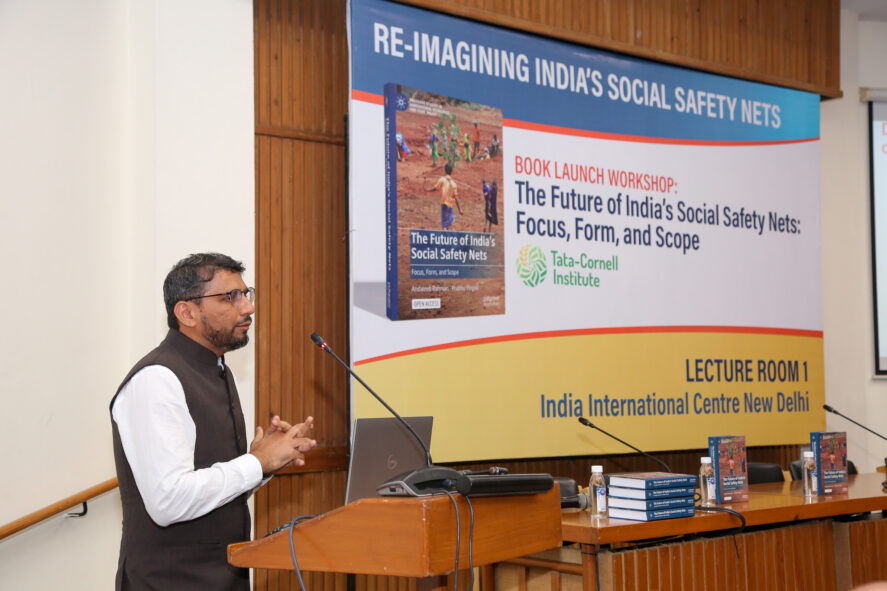
As India continues to grow and transform, the effectiveness of its social safety nets will be of the utmost importance for helping those left behind and addressing the country’s chronically high rates of poverty and malnutrition. The Tata-Cornell Institute’s (TCI) latest book, The Future of India’s Social Safety Nets: Focus, Form, and Scope, tackles these issues head-on by analyzing India’s social welfare programs and proposing a systemic approach to social protection that aims at fostering the resilience.
On August 8, TCI officially launched the book with an expert workshop in New Delhi that brought together researchers, practitioners, and policymakers to discuss key topics related to social protection, food systems, and welfare delivery. Key takeaways from each topic session—food and nutritional assistance; social Insurance, income, and livelihood loss; urbanization and informality; governance and welfare delivery; and federalism, finance, and state capacity—are presented below.
Food and nutritional assistance
The first panel of the day focused on the effectiveness of food assistance programs and their role in addressing hunger and nutrition.
Panelists
- Reetika Khera, Professor of Economics at the Indian Institute of Technology (IIT) Delhi
- JV Meenakshi, Professor at the Indraprastha Institute of Information Technology (IIIT), Delhi
- Bharat Ramaswami, Professor of Economics at Ashoka University
- Kalyani Raghunathan, Research Fellow at the International Food Policy Research Institute (IFPRI), Delhi
Key takeaways
- Coverage and accessibility: The Public Distribution System (PDS) has achieved coverage of 58% of the population, but challenges remain in ensuring that food security translates into nutritional security. Despite its implementation issues, the PDS proved crucial during the COVID-19 pandemic and works well in natural disasters like floods.
- Nutritional impact of subsidies: Grain subsidies have been a significant safety net, yet the per capita consumption of grains is declining, raising concerns about the effectiveness of these programs in improving nutritional outcomes.
- Need for comprehensive solutions: There is a call for repurposing social safety nets to focus more on nutritional security rather than merely food security, highlighting the importance of a holistic approach to food systems. It is also important to view the synergistic impacts of nutrition schemes in a way that examines the co-coverage of various schemes instead of viewing it as an impact-or-no-impact binary.
Social insurance, income, and livelihood loss
Following the discussion on food security, the second panel addressed the need for robust social insurance mechanisms and the challenges faced by marginalized communities.
Panelists
- Jean Dreze, Visiting Professor at Ranchi University & Honorary Professor at the Delhi School of Economics (DSE)
- R Manjula, Assistant Professor at the Institute for Social and Economic Change (ISEC), Bangalore
- Arti Ahuja, Career bureaucrat with the Indian Administrative System (IAS)
- Ashwini Kulkarni, Pragati Abhiyan, Nashik
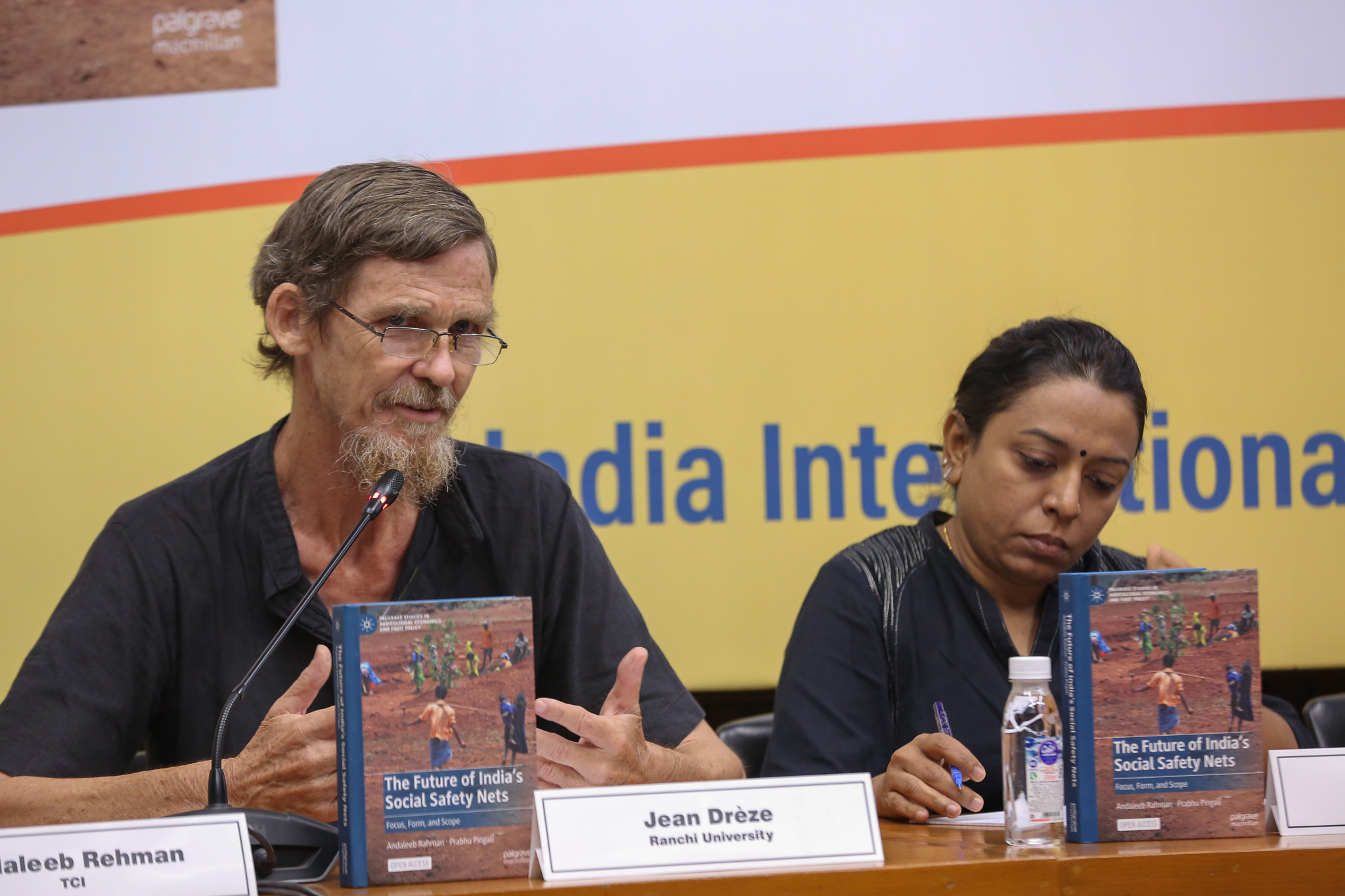
Jean Dreze participated in the panel on social insurance, income, and livelihood loss during the workshop.
Key takeaways
-
- Foundation for social safety nets: India has established a foundation for social safety nets, but many existing schemes have been destabilized, undermining their effectiveness. There is a need to consolidate the present nature of social safety nets to plan for the future. This involves moving from isolated welfare schemes to integrated systems. Social protection is an umbrella, and a social safety net is something that holds you in times of crisis.
- Improved targeting and shock-proofing livelihoods: Priority for the poorest of the poor has been lost in terms of universalization, which needs to be distinguished from uniformity. Social protection should be responsive to shocks and should be more inclusive and target vulnerable people.
- Employment opportunities: Women’s participation in the Indian workforce is low. New forms of employment, such as micro-tasking and self-targeted programs, are essential to adapt to the changing labor landscape and encourage women’s participation through institutional support frameworks such as creches, maternity endowments, etc.
Urbanization and informality
To shed light on the role of social safety nets in the urban context, the panel explored the implications of urbanization on social protection and the informal economy.
Panelists
- Sabina Dewan, President and Executive Director of JustJobs Network
- Gautam Bhan, Senior Lead, Academics & Research, and Associate Dean of the School of Human Development at the Indian Institute for Human Settlements (IIHS), Bangalore
- Pallavi Choudhuri, Senior Fellow at the National Council of Applied Economic Research (NCAER), New Delhi
- Jayan Jose Thomas, Professor of Economics at the Indian Institute of Technology (IIT) Delhi
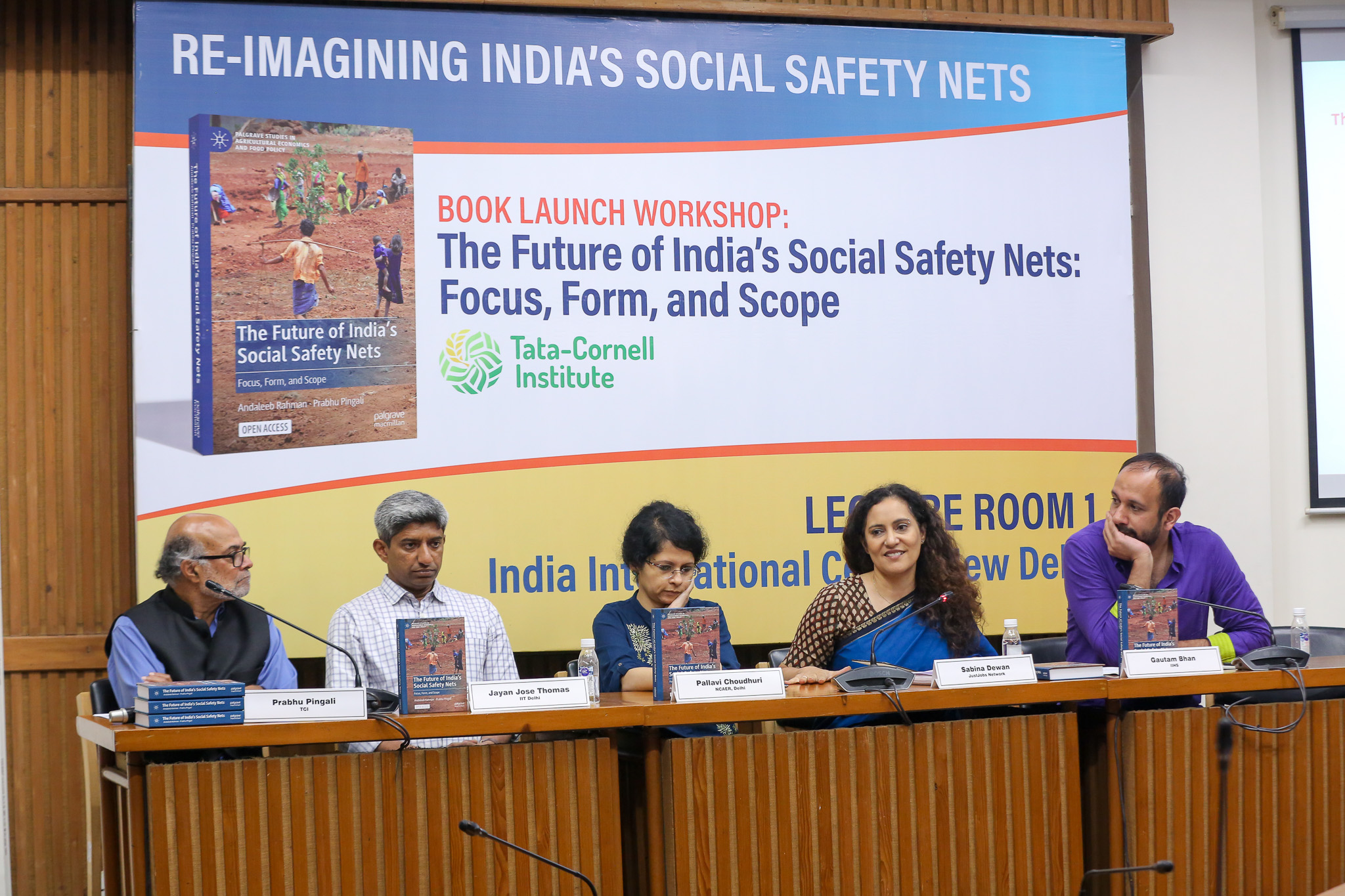
Experts on the panel on urbanization and informality discussed the changing nature of work in Indian cities and the gaps in social protection faced by many urban workers.
Key takeaways
- The changing nature of work: The rise of gig work and contractual employment has created new challenges for social safety nets, which must evolve to address the precarity of these jobs. During the COVID-19 pandemic, the precarity of these jobs and the system of accessing entitlements led informal workers to reverse migrate to rural areas to cope with the exigencies.
- Urban social protection gaps: There is a pressing need for urban social protection frameworks that can address the unique challenges faced by the urban poor, including stagnant wages, housing insecurity, and a weaker social contract. Additionally, there is a need for scalable models of care infrastructure and new social protection baskets that include housing, transportation to support mobility, and better support the urban poor.
- Regulatory needs: Effective regulation of informal work is crucial to ensure that workers have access to necessary protections and benefits. The panel also advocated for a system that prioritizes employment over gig work, suggesting that existing systems should be tweaked to better accommodate gig workers through differentiated and universalized approaches.
- Poverty identification gaps: Poverty is imagined as a static concept, whereas in reality, it is quite dynamic in nature. Chronic poverty has gone down, however transient poverty persists. Using Below Poverty Line (BPL) card holding to identify poverty can lead to exclusion and inclusion errors, leaving out many vulnerable informal workers. It is important to link social protection to employers and address the vulnerabilities associated with cash transfers, especially in the context of rural-urban differences.
Governance and welfare delivery
Any discussion on social safety nets is incomplete without contextualizing the governance structures necessary for effective welfare delivery. This panel shed light on these issues.
Panelists
- Farzana Afridi, Professor of Economics at the Indian Statistical Institute (ISI), Delhi
- Aaditeshwar Seth, Faculty in the Department of Computer Science at IIT Delhi
- Priyanka Vaze, Assistant Vice President of Program Design at Haqdarshak
- Aishwarya Narayan, Senior Research Associate at Dvara Research
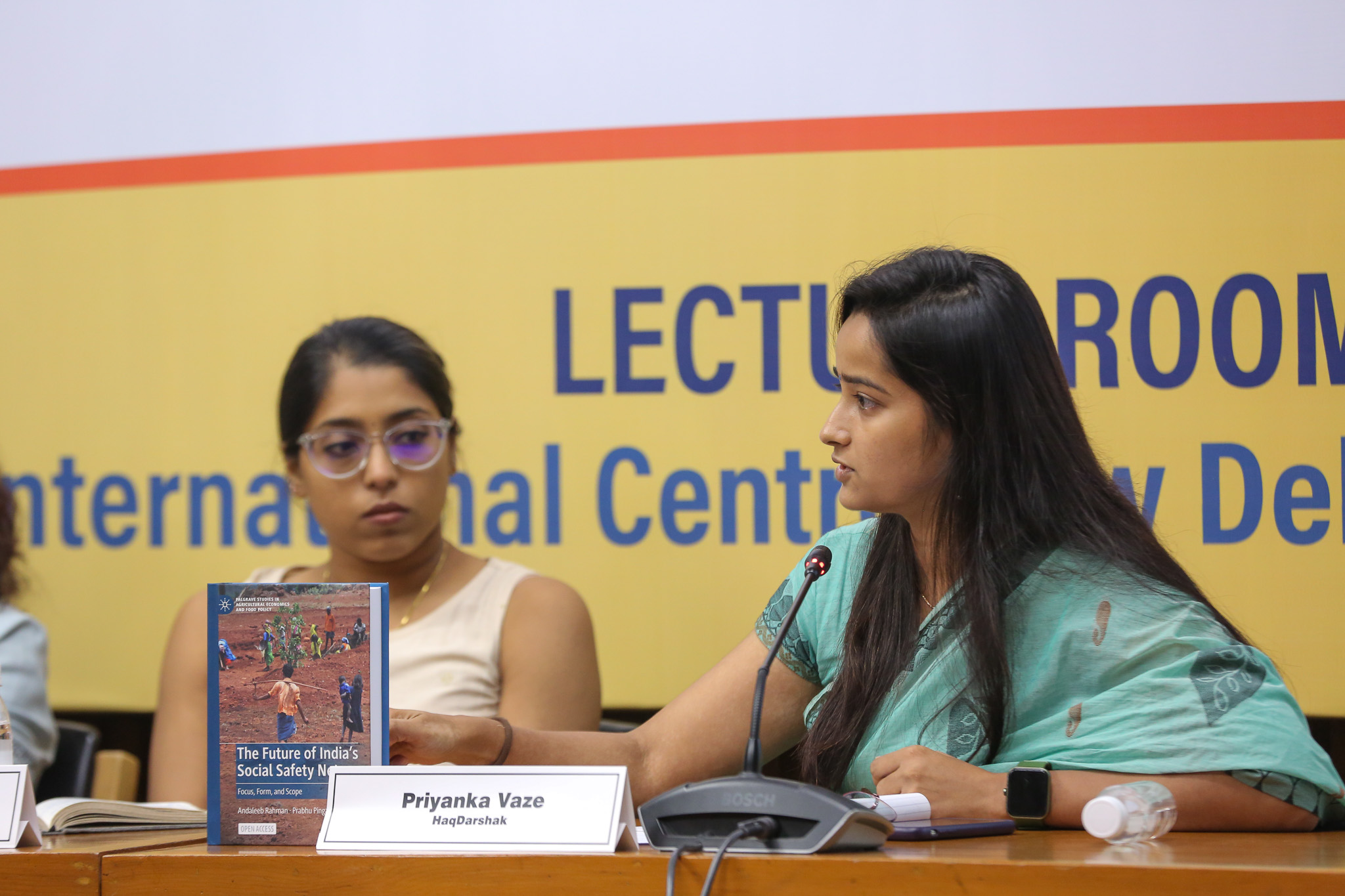
Priyanka Vaze spoke during the panel on governance and welfare delivery
Key takeaways
- Strengthening state capacity: Enhancing the capacity of state governance is essential to reduce leakages and improve the quality of public program delivery.
- Digital infrastructure: The shift toward digital public infrastructure can streamline welfare delivery, but it must be designed with citizens’ needs at the forefront to avoid exclusion errors. It is also important to leverage opportunities to use technology for social auditing, management information systems, and accountability to help prevent leakages.
- Community empowerment: Empowering communities to participate in governance processes can lead to better outcomes and more effective service delivery.
Federalism, finance, and state capacity
This panel discussed the role of federalism in shaping social safety nets and its financial implications.
Panelists
- Yamini Aiyar, Former President of the Centre for Policy Research (CPR), Delhi
- Rahul Verma, Fellow at CPR, Delhi
- Suyash Rai, Deputy Director and Fellow at Carnegie India
- Deepanshu Mohan, Professor of Economics and Director of the Centre for New Economics Studies at the Jindal School of Liberal Arts and Humanities, O.P. Jindal Global University
Key takeaways
- Political economy dynamics: The current political economy influences the design and implementation of social safety nets, necessitating a nuanced understanding of state-citizen relationships.
- Budgeting accountability: There is a need for a more accountable budgeting process that reflects the realities of social welfare needs and state capacities.
- Addressing informality and inequity: The intersection of informality and social protection must be addressed to ensure equitable access to benefits for all citizens.
- Fiscal constraints and tax reforms: Given fiscal constraints, there is a need for domestic reforms to improve the tax-to-GDP ratio, which has struggled to increase since peaking in 2007. The importance of medium-term planning for social safety and the need for states to have space for experimentation was also emphasized. It is important to address inequality and improve efficiency.
Moving forward
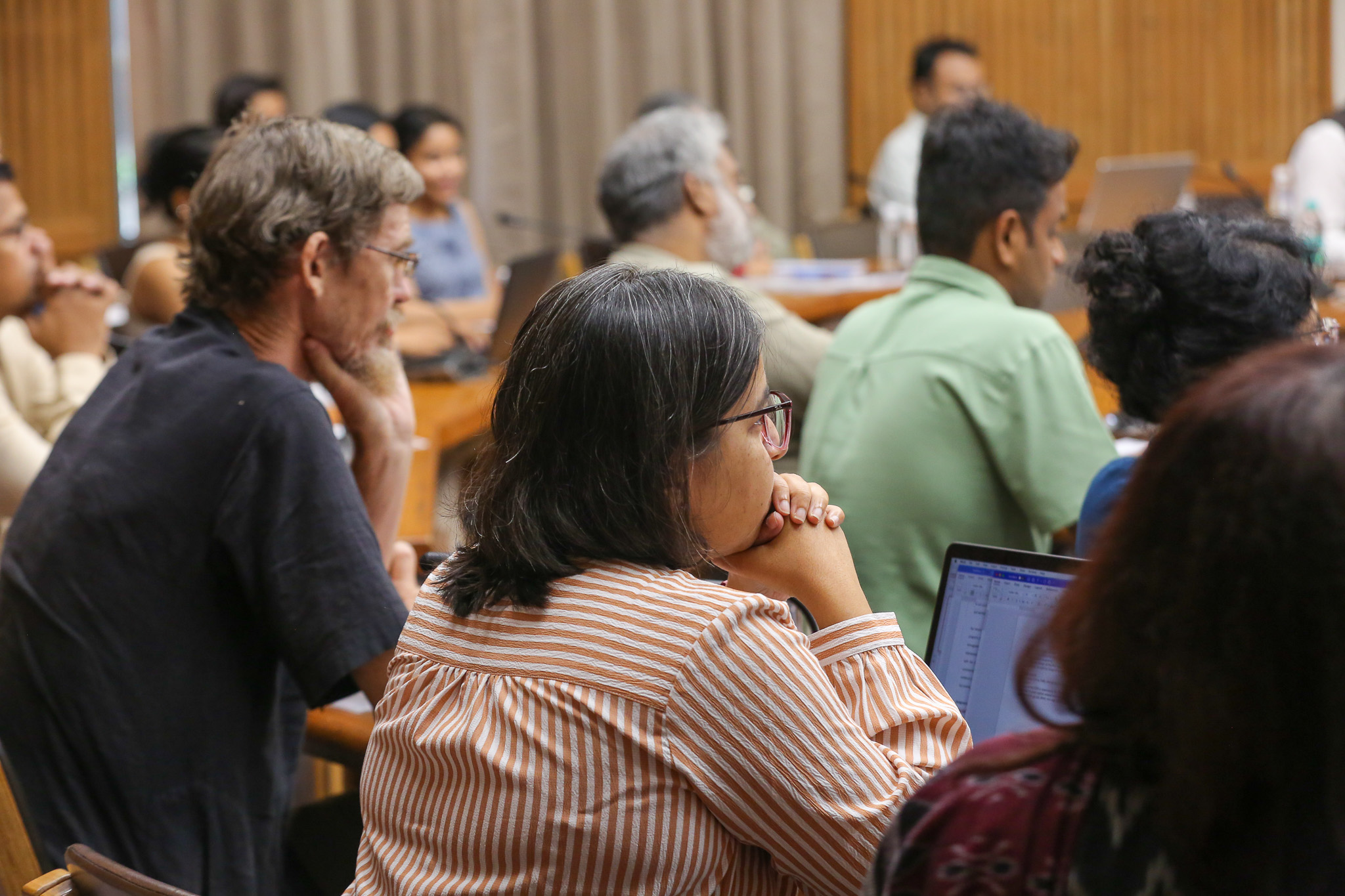
Workshop participants listen intently during panel discussions.
The discussions from the event highlighted the critical need for comprehensive reforms in India’s social safety net programs, food systems, and welfare delivery. As we navigate the complexities of poverty, nutrition, and social protection, it is essential to engage in ongoing dialogue and research to create effective policies.
To explore these issues further, download The Future of India’s Social Safety Nets today.
Aishwarya Gawali and Bharath Chandran C are associate researchers at the TCI Center of Excellence in New Delhi, India.
Featured image: TCI Research Associate Andaleeb Rahman speaks during the workshop launching his book, The Future of India’s Social Safety Nets. (Photo provided)

